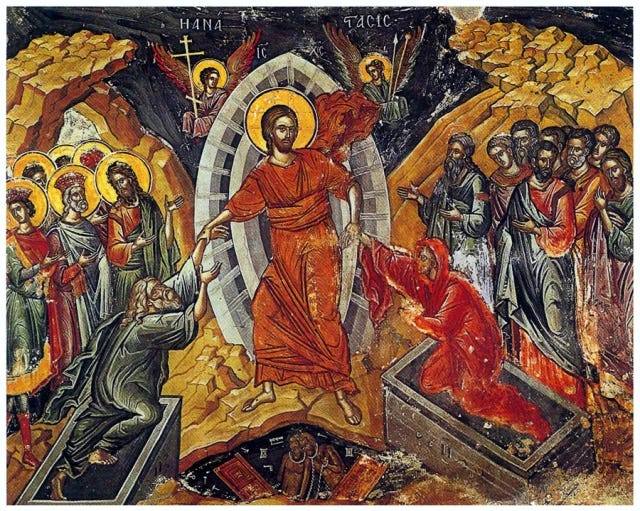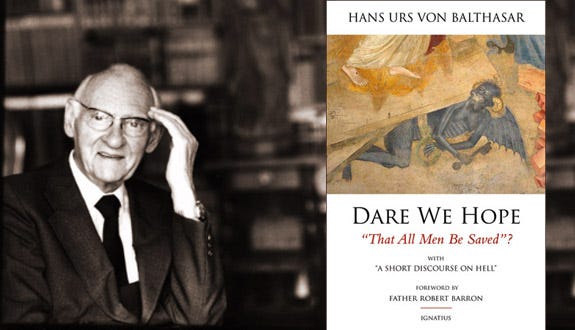Could Hell Be Found Empty In the End?
Responding to Universalism (& the Balthasar Option) with C.S. Lewis, the Church Fathers, & Sacred Scripture
Pope Francis recently made another splash in the news when he said:
“What I am going to say is not a dogma of faith but my own personal view: I like to think of hell as empty; I hope it is.”1
To be clear, the Pope is not saying that his view is an infallible dogma or that it is included within the teaching function (magisterium) of his office. He was simply giving his ‘private theological opinion’ to a public audience.
Nevertheless, I have big concerns. Why? Because the Pope did not elaborate on his answer, which took place on a late night talk show (Che tempo che fa is an Italian television late-night talk show hosted by Fabio Fazio). He did not say: “The Scriptures say… the Saints and Ecumenical Councils also say… the Catechism also says… but I still hold some hope that most or even all might be saved.”
When I was a theology teacher at a Catholic high school, I had students ask me questions about Hell all of the time, and it was my duty to go beyond my personal theological imagination and take them directly to the Scriptures, the fathers, the councils, and the catechism. (I am also pretty sure my pastor would have corrected me on this point if I simply said to my students, “I like to imagine hell as empty” and left it at that!)
We should also keep in mind that our private theological opinions are rarely kept private, and they can be deeply impactful upon others as they seek guidance from us. A teacher never stops teaching. A preacher never stops preaching. A parent never stops parenting, and an evangelist never stops evangelizing and sharing the truth of the Gospel in the public square.
I understand that the doctrine of Hell isn’t a popular one and can even be repulsive to us moderns (see C.S. Lewis’ comments in the video above or at the end of this article), but we must be honest with others about what our Lord had to say on the matter, or we will be guilty of not telling the whole truth of the Gospel.
Considering Universalism & the ‘Balthasar Option’
I have dear friends from various Christian backgrounds (Catholic, Orthodox, or Protestant) who were likely very happy with the Pope’s recent comments on hell. They are either universalists (I ‘believe’ everyone will be saved) or quasi-universalists (I ‘hope’ everyone will be saved and believe Scripture can be harmonized with this hope). The first view is related to the certainty of belief or even probability, while the second view is anchored less in belief and more in hope.
These distinctions are important for most Catholics and Orthodox today, because the first view was condemned by the Church as Origenism at the 5th ecumenical council (although a minority of scholars disagree such as Dr. David Bentley Hard, a staunch universalist who views an ‘eternal hell’ as immoral). In other words, hard universalism was considered to be a heresy for most of Christian history. The records of the 5th Ecumenical Council (Second Council of Constantinople 553 AD) state:
If anyone says or thinks that Christ the Lord in a future time will be crucified for demons as he was for men, let him be anathema. (Anathema 7)
If anyone says or thinks that the punishment of demons and of impious men is only temporary, and will one day have an end, and that a restoration (ἀποκατάστασις) will take place of demons and of impious men, let him be anathema. (Anathema 9)
Even before the 5th Council, St. Augustine stated that Origen’s views were being rejected by the consensus of the Church:
“I am aware that I now have to engage in a debate with those compassionate Christians who refuse to believe that the punishment of hell will be everlasting…On this subject the most compassionate of all was Origen, who believed that the Devil himself and his angels will be rescued from their torments and brought into the company of the holy angels…
But the Church has rejected Origen’s teaching…Is it not folly to assume that eternal punishment signifies a fire lasting a long time, while believing that eternal life is life without end? For Christ, in the very same passage, included both punishment and life in one and the same sentence when He said, ‘So those people will go into eternal punishment, while the righteous will go into eternal life’”2
The second view relates to the virtue of hope and was a view developed by the Catholic theologian, Hans Vons Balthasar, in the late 20th century. His view was quite nuanced and stated that we should cultivate a hope that everyone could be saved, and unlike Origenism, he intentionally detached it from any certainty of belief or doctrine. However, he did believe that the possibility of an empty hell could harmonize with Scripture and Divine Revelation, which is important to note. Today, you will find many Balthasarians in our midst such as Bishop Robert Barron, Metropolitan Kallistos Ware of Blessed Memory, Dr. Larry Chapp, and apparently, Pope Francis. (*You can read more of Bishop Barron’s nuanced view here.)
In my opinion, Balthasar’s view does give people the option to be open to universalism even if they are only hoping and only praying for that outcome. Why? Because to have ‘hope’ means that it can still happen, which ultimately means that the teaching and language of Scripture can be reconciled with ‘the empty hell’ theory.
There is obviously nothing wrong with hoping for something good to occur, but we cannot hope for something which has either already occurred or Divine Revelation has closed off for us as a possibility. For example, I cannot hope that we will have cherry cordial ice cream on my wedding day, because we already had homemade lemon ice cream at the reception 15 years ago! The same goes for Scripture. The Bible presumes that there are already people in Hell who have firmly rejected God, because they persisted in their hostility towards Him and His people to the very end. I always point to the death of King Herod Agrippa in Acts 12:21-23.
“About that time King Herod laid violent hands upon some who belonged to the church. 2 He had James, the brother of John, killed with the sword. 3 After he saw that it pleased the Jews, he proceeded to arrest Peter also… 21 On an appointed day Herod put on his royal robes, took his seat on the platform, and delivered a public address to them. 22 The people kept shouting, “The voice of a god, and not of a mortal!” 23 And immediately, because he had not given the glory to God, an angel of the Lord struck him down, and he was eaten by worms and died.”
Not only did King Herod Agrippa persecute and martyr God’s people right up to his death, but he also implicitly declared himself God for which he was struck down by the angel and eaten by worms. Like the Woman of Revelation who sits upon the Beast (See Revelation 17), King Herod also ‘drinks’ and is satisfied with the blood of the saints. His fate seems fused with the same fate of the Beast, and his death is loaded with the symbolism of hell (“the worm that doesn’t die”).
It seems to me that the overall narrative and literary structure of Scripture rules out ‘the empty hell’ option by depicting certain figures as willfully defiant and blasphemous towards God even to their dying breath. If we assume that the traditional understanding of ‘no repentance after death’ is true (i.e. no complete reversal of hardened wills), then it means that these figures died in friendship with the Kingdom of Darkness, and their fate is the same as “the Prince of this world” (see John 14:30). Other Biblical theologians and literary scholars have come to the same conclusion such as C.S. Lewis (see below) or Dr. Ben Witherington (although he seems open to the possibility of annihilationism).3
C.S. Lewis’ Definitive Rejection of Universalism (& the Balthasar Option)
C.S. Lewis believed that universalism and the ‘empty hell’ theory is incompatible with the language and literary integrity of the Scriptures. In some recently discovered letters, he writes:
“The Dominical utterances themselves — seemed to me irreconcilable with universalism. The finality of the Either-Or… the Sheep and Goats, the Wheat and Tares, the Wise and Foolish Virgins — is so emphatic and reiterated in Our Lord’s teaching that, in my opinion, it simply cannot be evaded. If we do not know that He said that, then we do not know what He said about anything.”4
This does not mean that Lewis was happy with his conclusion. He was repulsed by the thought of hell as an atheist and continued to find it detestable even as a Christian, but he thought it was true. In ‘The Problem of Pain,’ he writes,
[Hell is a] “detestable doctrine— and indeed, I too detest it from the bottom of my heart… There is no doctrine which I would more willingly remove from Christianity than this, if it lay in my power. But it has the full support of Scripture and, specially, of our Lord’s own words; it has always been held by Christendom; and it has the support of reason”5
In Part 2 of this article, we will look at how C.S. Lewis dealt with the topic of Hell and consider whether he believed in annihilationism (the soul is eventually annihilated in Hell). We will also compare his own views to St. Maximus the Confessor along with other church fathers and of course, Sacred Scripture.
In conclusion, let us trust the One who has already defeated Hell and opened up the path of salvation for all who will pick up their cross and follow Him.
Be entirely His,
Kyle
https://www.catholicnewsagency.com/news/256542/pope-francis-i-like-to-think-of-hell-as-empty
St. Augustine of Hippo. “City of God” Book 21, chapters 17, 23.
Prolific New Testament Scholar, Dr. Ben Witherington, writes: “I don’t think we can debate that the NT says there is a place we today call Hell, and that some people will end up there, because of their own choices and wickedness. Whether they will experience eternal torment is more debatable. My advice however is that we abstain from pronouncing a final judgment on any human soul; that is Jesus’ job at the final judgment. We simply don’t know the outcome of many who are not followers of Christ now….
What I am more sure of than ever, is that there is no salvation outside of Jesus Christ, and that in the end ‘every knee will bow and ever knee confess’ even those humans or demons who want to have nothing to do with Jesus thereafter. Salvation in the end is not just a matter of being forced to recognize the truth — it’s about positively embracing and trusting that truth. And there are apparently some who will never ever do that. To them God says “if you insist, have it your way”. Hell is the place you experience the absence of the presence of God for as long as you continue to exist. Whether there is a time when Hell will cease to exist, like the crystal sea of Revelation, equally orthodox persons can debate. Annihilation or destruction of Satan, Hell and its inhabitants is a possible interpretation of the eschatological endgame, but it is also possible Hell will go on ‘olam wu olam wu olam‘….
Hell in the New Testament is a constant reminder that there is a final accountability for our beliefs and behaviors in this life, whatever the particulars and temperature and durability of Hell may be. It is a reminder that this life is basically the time of decision, and the decisions we make now can indeed have eternal consequences in the afterlife. And, frankly, this is not bad news. It is a part of the Good News that in the end justice as well as mercy, righteousness as well as compassion, and holiness as well as love wins. Thanks be to God.” (See full article: https://www.patheos.com/blogs/bibleandculture/2011/03/16/hell-no/)
Weems, Reggie. “Universalism Denied: C. S. Lewis’ Unpublished Letters to Alan Fairhurst. Journal of Inkling Studies. Copyright © 2016 American Theological Library Association.Found: https://afkimel.files.wordpress.com/2021/12/universalism-denied.pdf
Lewis, The Problem of Pain (New York: Macmillan. 1944), p. 118.







With all due respect, I do not believe that the speech of the Holy Father, Pope Francis, necessarily implies that he is a Balthasarian or that he supports any form of “Hopeful Universalism”.
He simply stated that he likes to think of hell as being empty; we, as Christians, must exercise charity towards our neighbors, which includes the desire for them to be saved, however, no one is excluded from such charity, so we must desire the salvation of everyone.
This does not mean that everyone will be saved, because at the end of the day, God did everything possible for everyone's salvation, even to the point of emptying Himself of His Divinity and taking the form of a humble servant, but the sinner can decide to resist until the end, and continue to spit in the face of Christ.
Pope Francis has often stated that hell is a real possibility, and has even urged members of the mafia to repent, stating that there is still time not to end up in hell, and he states that there is a sin that cannot be forgiven, that of corruption, and the reason for this is quite simple: someone cannot be forgiven if they do not desire forgiveness.
Of course, the speech that was made was extremely brief and could have been much more elaborate, however, the conclusion that the Holy Father was granting Baltashar's theological views is a stretch.